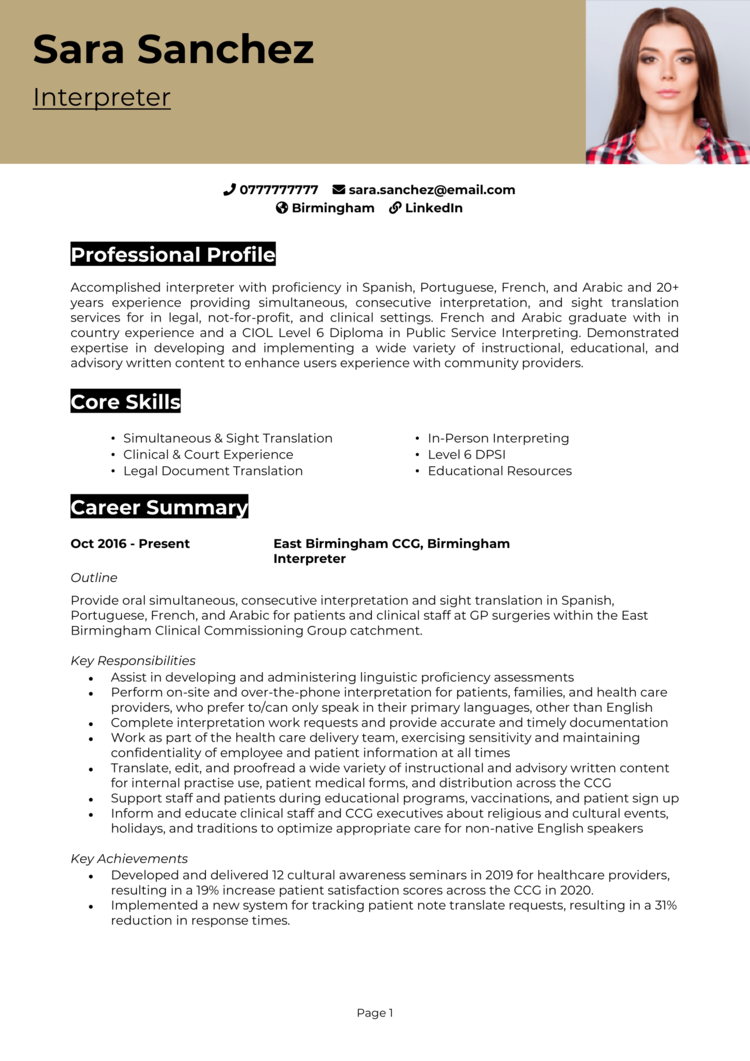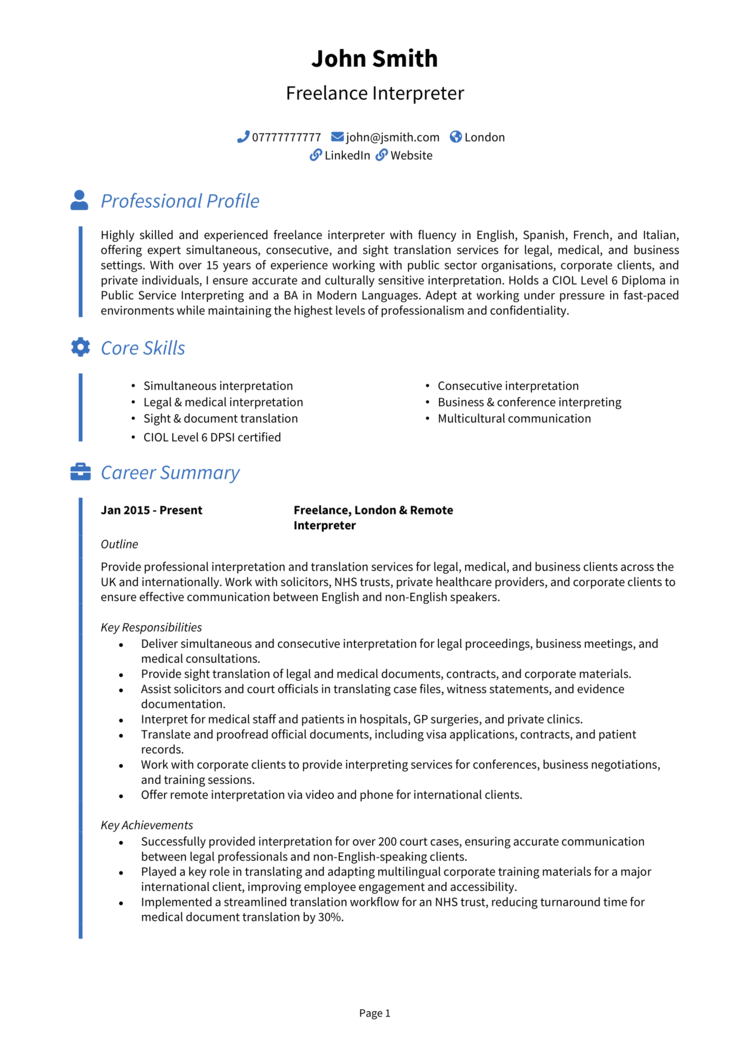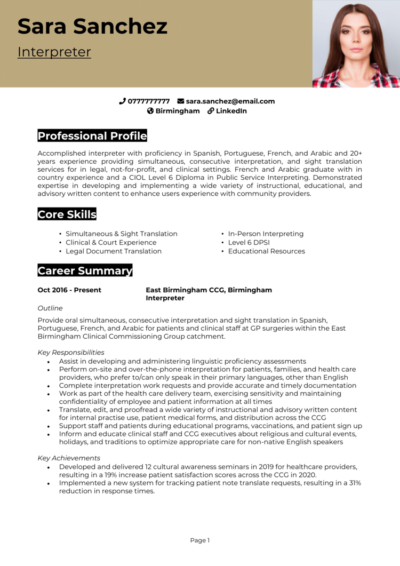You can switch between languages without blinking – but when it comes to translating that into a top-notch CV? That’s often where things get lost in translation.
Being fluent in numerous languages is undoubtedly impressive, but recruiters won’t be convinced unless your CV communicates just as clearly.
This guide (complete with Interpreter CV examples) will help you craft a clear, professional CV that gets straight to the point – so you can land more interviews and put those linguistic skills to work.
Interpreter CV example

Freelance Interpreter CV example

How to write your Interpreter CV
Discover how to craft a winning Interpreter CV that lands interviews with this simple step-by-step guide.
This step-by-step guide walks through writing a CV as an interpreter – from choosing the right structure to showcasing your specialist language skills and certifications.
Every section is designed to help you present your qualifications, fluency levels, and interpretation experience in a way that resonates with recruiters and clients alike.
How should you structure and format an Interpreter CV?


In the interpreting world, clarity is everything – and the same applies to your CV. A jumbled, hard-to-read CV layout will only confuse recruiters, no matter how many languages you speak. Your structure will need to effortlessly guide hiring managers through every aspect of your experience and expertise that makes you the right fit for the role.
Here’s the layout to follow:
- Name and contact details – Place your name and contact details prominently at the top of your CV for quick access. Adding a photo of yourself is up to you.
- Profile – Open with a compelling overview of your skills, experience, and career goals.
- Core skills – List your key abilities in this section, focusing on those that will be most relevant to the job.
- Work experience – Provide a detailed breakdown of your work history, starting with the most recent job first, detailing responsibilities and achievements.
- Education – List your qualifications, including degrees and relevant certifications, in reverse chronological order.
- Additional info – Use this optional space for relevant hobbies or personal pursuits that enhance your application.
Use bullet points to make information quick to scan, add headings to clearly separate sections, and pick a clean, professional font. Aim to keep your CV length under two pages – it should be sharp, informative, and to the point. Remember that if a CV’s format is full of avoidable visual mistakes, even the most qualified candidates would get lost in the reject pile.
Writing an Interpreter CV profile


The CV profile is your chance to introduce yourself as a confident and capable interpreter in just a few lines. It should communicate your language expertise, your interpreting experience, and the settings you’ve worked in.
Tailor this intro to the type of role you’re going for – and remember that your job is to convince recruiters that you would benefit them, should you land the role.
Interpreter CV profile examples
Profile 1
Experienced Interpreter with over six years of experience providing real-time language support across healthcare, legal, and social services settings. Fluent in English and Spanish, with strong command of cultural nuance, confidentiality, and industry-specific terminology. Adept at simultaneous and consecutive interpretation, maintaining accuracy and professionalism under pressure.
Profile 2
Reliable and articulate Interpreter with five years of experience supporting communication in legal proceedings, immigration services, and government agencies. Specialises in English-Arabic interpretation and document translation. Skilled in conveying tone and meaning accurately, ensuring clear understanding between all parties in high-stakes environments.
Profile 3
Detail-oriented Interpreter with seven years of experience working in educational, community, and public health environments. Fluent in English and Mandarin, with a strong background in consecutive interpreting, note-taking, and client liaison. Recognised for cultural sensitivity, impartiality, and the ability to remain composed in emotionally charged situations.
Details to put in your Interpreter CV profile
Make sure your profile includes the following:
- Where you worked – Mention whether you’ve interpreted for courts, hospitals, government agencies, or private clients.
- Your top qualifications – Include any interpreting diplomas, degrees in languages, or specialist certifications.
- Essential skills – Highlight things like consecutive or simultaneous interpreting, note-taking, or cultural awareness.
- Languages and fluency – State your working languages and fluency levels using recognised terminology (e.g. native, fluent, professional proficiency).
- Types of assignments handled – Indicate if you’ve worked on live broadcasts, multilingual meetings, interviews, or asylum casework.
Writing an effective core skills section


Think of this section as a highlight reel of your interpreting strengths. In just a handful of bullet points, you can quickly show recruiters that you have the linguistic and professional capabilities they’re looking for.
Make sure you stick to concrete skills like “consecutive interpretation” or “simultaneous conference support” rather than vague claims like “great communicator.”
This section is especially easy to tailor – simply switch out or reword your CV skills to match the specific language pair or interpreting context required in each job posting.
The top skills to highlight in your Interpreter CV
- Simultaneous and Consecutive Interpretation – Accurately translating spoken language in real time or during pauses between speech for clear communication.
- Fluency in Multiple Languages – Speaking and understanding at least two languages fluently, often including industry-specific terminology.
- Listening and Comprehension – Quickly understanding spoken information, tone, and context to deliver accurate translations.
- Cultural Sensitivity – Conveying meaning in a way that respects cultural nuances and avoids misinterpretation.
- Note-Taking and Memory Skills – Using memory techniques or shorthand to retain and relay detailed spoken content accurately.
- Specialised Knowledge – Interpreting in fields such as medical, legal, business, or diplomatic contexts with precision and professionalism.
- Confidentiality and Ethics – Adhering to strict codes of conduct and ensuring client confidentiality at all times.
- Public Speaking and Clarity – Communicating clearly and confidently to individuals or groups in high-pressure or formal settings.
- Preparation and Research – Studying relevant topics, terminology, and context before interpreting sessions or events.
- Use of Technology – Using headsets, microphones, remote interpretation platforms, or video conferencing tools for in-person and virtual assignments.
Showcasing your work experience


Now it’s time to show your interpreting work experience in action. Whether you’ve worked in fast-paced courtrooms, quiet hospital rooms, or packed conference halls, this section should prove that you can perform under pressure.
Break things down into bullet points so they’re easy to read and focus more detail on recent or relevant roles. List your roles in reverse order, beginning with your most recent. Focus on what you actually did – the languages used, and the settings you used them in.
Even if your experience isn’t all in interpreting, you can still draw on translation work, tutoring, or bilingual admin roles to show transferable skills.
Writing job descriptions for past roles

- Outline – Start with who you worked for and what kind of interpreting you did. Mention the language pair, type of employer (e.g. NHS, tribunal, private sector), and setting.
- Responsibilities – Explain your daily tasks: consecutive interpreting, sight translation, note-taking, handling sensitive information – be specific and use strong action verbs.
- Achievements – Show the impact of your work where possible. This could include client satisfaction, the number of sessions handled, or success in high-pressure or complex cases.
How to present past roles for an Interpreter
Interpreter | Eastgate NHS Services
Outline
Provided live interpretation services for patients and clinicians across hospitals and clinics, supporting safe and accurate communication in healthcare settings.
Responsibilities
- Delivered consecutive interpretation between medical staff and patients during consultations, assessments, and procedures.
- Explained medical terminology, diagnoses, and treatment plans with cultural sensitivity.
- Translated patient information leaflets and consent forms when required.
- Maintained strict confidentiality and adhered to NHS safeguarding policies.
- Supported communication during emergency cases and mental health assessments.
Achievements
- Helped improve patient understanding and satisfaction in non-English-speaking cases.
- Praised by clinical staff for clarity and professionalism during complex consultations.
- Recognised by team leads for reliability and calm presence during urgent care situations.
Interpreter | Lighthouse Legal Services
Outline
Offered in-person and remote interpretation for legal clients, supporting solicitors, barristers, and court officers in cases involving non-native English speakers.
Responsibilities
- Interpreted during legal interviews, depositions, and family court hearings.
- Ensured accurate representation of client statements and legal advice.
- Translated legal documents, affidavits, and immigration paperwork as needed.
- Observed professional boundaries and impartiality throughout all assignments.
- Provided interpretation services both in-person and via secure video platforms.
Achievements
- Assisted in over 200 legal cases involving family, asylum, and criminal law.
- Achieved consistently positive feedback from legal teams and court officials.
- Recognised for fluency in complex legal terminology and client confidentiality.
Interpreter | Bridgepoint Community Services
Outline
Supported community-based interpretation needs for schools, social services, and public health departments, working with vulnerable individuals and families.
Responsibilities
- Facilitated communication between social workers, educators, and service users.
- Conducted home visits and parent meetings with cultural awareness and discretion.
- Assisted with interpreting during mental health outreach and safeguarding reviews.
- Translated written information such as school notices and housing forms.
- Adapted communication style to meet the needs of children and adults with varying levels of literacy.
Achievements
- Enabled improved access to education and support services for non-English-speaking families.
- Trained volunteers on basic interpreting principles and boundaries.
- Recognised by community teams for compassionate and effective communication.
Highlighting your education


Your qualifications speak volumes – literally. This section is where you list your academic background, language-related degrees, and any formal interpreting certifications.
If you’ve got strong experience, just include the essentials. But if you’re earlier in your career or changing direction, feel free to expand on any relevant education, like courseworks and placements. List everything in reverse chronological order – most recent qualifications first.
The best qualifications to boost an Interpreter CV
- Diploma in Public Service Interpreting (DPSI) – A highly respected UK qualification for interpreters in public services such as health and legal settings.
- Level 6 Diploma in Community Interpreting – Widely recognised for interpreters working with councils, hospitals, and social services.
- BA (Hons) in Modern Languages or Interpreting and Translation – An academic foundation that demonstrates fluency and theoretical grounding.
- NRPSI Registration (National Register of Public Service Interpreters) – Adds professional credibility and is often required for public sector interpreting in the UK.
- MA in Conference Interpreting – For high-level interpreters working in international conferences, media, or EU settings.





